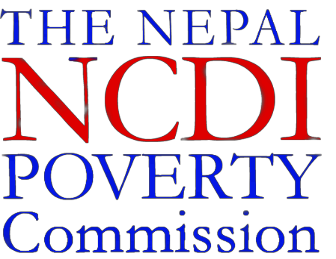The Nepal NCDI Poverty Commission, led by Co-Chairs. Bhagawan Koirala from Tribhuvan University, and the Secretary at the Nepal Ministry of Health, is the first group in Nepal that brings experts from diverse disease specialties together to address NCDIs and equity. Commissioners represent a range of fields — medicine, surgery, population epidemiology, economics, and journalism — and a variety of institutions within Nepal — the Ministry of Health, the National Health Research Council, Kathmandu Medical College, Tribhuvan University, Harvard University, University of Washington, Possible Health, and key hospitals and specialty cardiovascular and cancer centers.
Nepal NCDI Poverty Commission established in 2016 with a mandate to analyse the state of non-communicable diseases and infections (NCDIs) in Nepal and to recommend a package of cost-effective health sector interventions addressing the NCDI burden, with an emphasis on conditions affecting the poor in Nepal. The Commission convened its first meeting in November, 2016, and completed phase 1 of the National Commission Process—situation analysis and priority setting—over the next 18 months . In March, 2018, the Commission published a report presenting its findings and recommendations.230 The Commission found that NCDIs account for nearly two-thirds (65%) of the burden of disease in Nepal and that more than half of the NCDI conditions with the highest burden of disability-adjusted life-years (DALYs) in Nepal are not related to the 4×4 risk factors that have been emphasised by global monitoring frameworks and action plans. Their analysis also determined that, with the notable exceptions of diabetes and high blood pressure, the prevalence of many NCD categories was highest among the poorest quintiles of the population. To establish priorities for conditions and interventions, the Commission first ranked all NCDI conditions based on their overall health impact (total DALYs) and prevalence in Nepal. They then evaluated each condition for severity, inequity in outcomes between those who are poor and not poor, and impoverishing impact, to arrive at a list of 25 conditions requiring priority attention. To identify interventions to address this burden, the Commission worked from the Disease Control Priorities 3rd edition package of cost-effective interventions to achieve universal health coverage (UHC) in low-income countries. 23 of these interventions were selected for further evaluation based on their alignment with the disease conditions prioritised by the Commission, feasibility in the Nepali context, cost-effectiveness, financial risk protection, and equity. If these interventions are introduced and incrementally intensified to establish UHC, the Commission estimated that nearly 10000 premature deaths per year could be averted by 2030, with an increase in costs of approximately US$8·76 per capita. In June, 2018, the Commission initiated work on phase 2 of the National Commission Process. The Commission’s key objectives for this second phase include: disseminating the findings in the Commission report, determining the readiness of the Nepal Government to incorporate the recommendations of the report, critically analysing NCDI poverty issues among children and young adults, and developing and piloting models for integrated delivery of prioritised NCDI services.
Throughout 2017 and early 2018, the commission conducted a cost analysis and impact assessment of two important innovations for delivering NCDI services to the poor:
- A national program that guarantees cardiac surgery, free of charge, for all children with congenital and rheumatic heart disease; and
- A country-wide initiative providing all patients below the poverty line with government subsidized medical support for 9 major NCDs.
On 6 June 2019, the Nepal NCDI Poverty Commission met to conduct a mid-term review of Phase II activities, including an in-depth analysis on childhood NCDIs and the integration science facility assessment.
On 3 February 2020, the Nepal NCDI Poverty Commission convened to successfully close out their Phase II activities and launch their Phase III round of initiatives. The Commission’s momentum continues to grow and members are interested in childhood NCDIs and PEN Plus national operational planning in particular.
